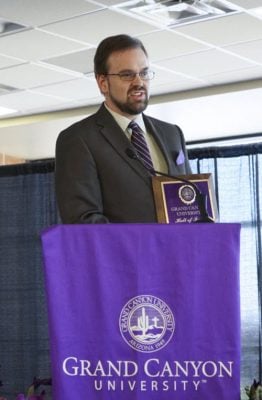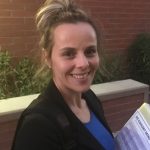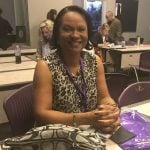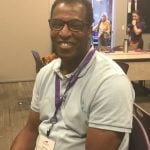By Karen Fernau
GCU News Bureau
The dictionary defines cohort as a group of people banded together for a common purpose.
To nearly 200 Grand Canyon University doctoral learners, some from out of state, attending a mini-conference last week on campus made this cohort so much more.

Theirs is a DC Cohort, the name of a student learning community that builds a network of support, collaboration and communication, a lifeline during their academic journey to a doctorate. It’s also one that helps learners discover their dissertation topic, learn how to conduct an exhaustive literature review and collect data.
“A cohort gives learners the opportunity to be fully engaged in their academic culture,” said Dr. Michael Berger, dean of the College of Doctoral Studies. “It gives them extra support they need to be successful.”
The DC Cohort last week was the fourth mini-conference the college has conducted. Created by the student and alumni members of the learning community, it gives current doctoral students a chance to gain assistance and support for their dissertation process from peers, faculty members and program chairs.
Enesa Barut Pjano, working toward a doctorate in psychology, attended the Doctoral Community Cohort mini-conference to build a support group.

“I’m a stay-at-home mother with two kids and am an online student,” she said. “Sometimes I need to just talk with someone else who is facing the same challenges.”
Delphine Bronell, a GCU adjunct English instructor and doctoral learner in organizational leadership, considers those in her cohort “brothers and sisters.”
The Avondale resident said the network helps her both academically and emotionally.

“We support each other, and that support helps keep us on track,” she said.
For Dwight Farris, a doctoral psychology learner and computer programmer/analyst instructor at the University of Arizona, the cohort allows him to learn from fellow learners and faculty.
“It’s an opportunity to learn as much as I can about the process, how to achieve my goal,” he said.
For Berger, the mini-conference stands out because it is planned and sponsored by learners.

“It’s a grassroots conference by and for students,” he said.
The DC Cohort learning community was established in 2013 by two doctoral learners, Rachel Behling and Cathy Ames, as a way to build a bridge between students and the University. Their first meeting drew 24 learners.
“Studies show that students who graduate from doctoral programs feel connected to their university, the program, the faculty and other learners,” said Behling, a GCU doctoral senior research specialist who received her doctorate in Organizational Leadership last April.
Along with networking, the mini-conference focused on essential tools necessary for independent scholarship.
Faculty volunteer lecture on topics ranging from literature review, narrowing research, quantitative analysis and writing tips to theoretical foundations.
Dr. Lori Wieters, a GCU doctoral chair who led a presentation on doctoral templates and rubrics, said the mini-conference is especially valuable to online learners.
“Students are often looking for answers, and they are not going to find them sitting in a room by themselves,” said Wieters, an industrial organizational psychologist.
The mini-conference also allows learners to meet potential doctoral chairs.
“I’m just starting and want to be able to meet as many chairs as possible to be able to select one that works best for me,” said Jessica Flayer of Tucson, a doctoral learner in general psychology.
Chantel Dooley, a former science teacher and doctoral learner in general psychology, attends both of the mini-conferences held every year.
For the Scottsdale learner, the nearly three-hour conference gives her both practical academic tools and, more important, motivation.
“I just love to come here and talk to people who speak the same language that I do,” she said. “I know that working toward a doctorate means that I am an independent learner, but when I come here, I never feel alone. It makes me want to work harder.”
Contact Karen Fernau at (602) 639-8344 or [email protected].



































































